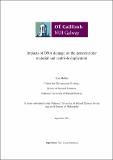Impacts of DNA damage on the pericentriolar material and centriole duplication

View/
Date
2015-12-03Author
Mullee, Lisa
Metadata
Show full item recordUsage
This item's downloads: 1152 (view details)
Abstract
The centrosome consists of two barrel-shaped centrioles embedded in a proteinaceous pericentriolar material (PCM), a highly organised scaffold that serves as a platform for proteins that regulate spindle assembly, protein degradation and organelle trafficking. The large coiled-coil protein, pericentrin, is a major structural component of the PCM. Centrosome duplication is tightly controlled so that it happens once and only once per cell cycle. The caspase-like protease, separase, promotes centrosome duplication via cleavage of centriolar cohesin and pericentrin. Genotoxic stresses lead to centrosome amplification, a frequently observed feature in cancer. Pericentrin has been implicated in the control of DNA damage responses (DDR) through its interactions with checkpoint kinase 1 (CHK1) and microcephalin (MCPH1).
In this thesis, we explored the impacts of DNA damage on centrosome duplication, and the regulation of the PCM and separase in the DNA damage response. We developed a centrosomal-localising molecular sensor that detected separase activity at both the chromosomes and the centrosomes in early mitosis. A gene targeting approach to tag endogenous human separase for investigation into the direct regulation of separase in response to damage generated heterozygotes, which did not express the tagged protease. Homozygotes were not obtained, possibly due to unexpected indels occurring in targeted alleles. Investigations into the impact of ionizing irradiation on the PCM components pericentrin and CDK5RAP2 revealed a marked expansion in volume and a noticeable change in higher order organisation. PCM expansion was dependent on CHK1 kinase activity and was potentiated by MCPH1 deficiency. Furthermore, pericentrin deficiency or mutation of a separase cleavage site blocked DNA damage-induced PCM expansion. The extent of nuclear CHK1 activation after DNA damage reflected the level of PCM expansion, with a reduction in pericentrin-deficient or separase cleavage site mutant-expressing cells, and an increase in MCPH1-deficient cells that was suppressed by the loss of pericentrin. Deletion of the nuclear export signal of CHK1 led to its hyper-phosphorylation after irradiation and reduced centrosome amplification. Deletion of the nuclear localisation signal led to low CHK1 activation and low centrosome amplification. From these data we propose a feedback loop between the PCM and the nuclear DNA damage response in which CHK1 regulates pericentrin-dependent PCM expansion to control its own activation.

